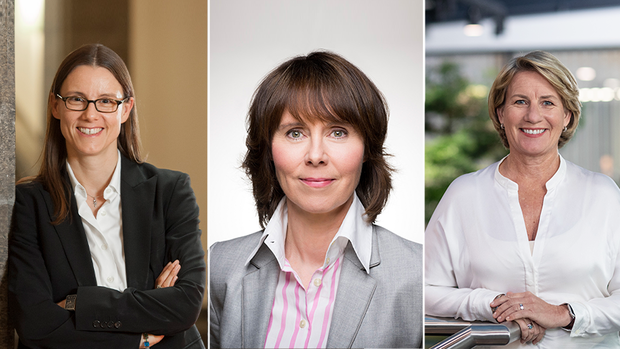Dusseldorf More women are represented on the supervisory boards of Germany’s largest listed companies than ever before. This year, for the first time, more women than men were elected to the supervisory bodies of the 40 companies in the leading index Dax: 55 percent of all newly awarded mandates went to female candidates.
This is shown by an analysis by the HR consultancy Russell Reynolds Associates, which is based on the invitations to general meetings and the elections that have already taken place. It is true that more women gave up their positions than ever before – almost every third member of the Supervisory Board who left was female.
Overall, however, the highest increase within one year since 2016 meant that the proportion of women on the owner side climbed to 37.8 percent. If you include the employee representatives, the proportion is currently 38.3 percent.
Clara Streit is one of the rising stars of the year. The former McKinsey partner is not new to the supervisory board of the real estate group Vonovia. However, she took over the chair from Jürgen Fitschen, former head of Deutsche Bank. The 54-year-old has also been the first woman to head the German Corporate Governance Commission since March.
A real, if not undisputed, newcomer to the league of Dax controllers is Katrin Suder. The former McKinsey adviser and Secretary of Defense was considered one of the key figures in the so-called adviser affair. Suder has been on the Deutsche Post board of directors since May.
Supervisory Board: Only Porsche SE fails to meet the targets for the proportion of women
Ute Wolf secured two new mandates. The former head of finance at Evonik moved into the control committees of the chip manufacturer Infineon and the engine manufacturer MTU. The 55-year-old mathematician impresses with her expertise in financing issues and, with a total of four mandates – in addition to Infineon and MTU, she also controls the asset manager DWS and the steel trader Klöckner & Co – belongs to the group of multiple supervisory boards.
The influential inspectors, each with two posts, include Nathalie von Siemens (Siemens, Siemens Healthineers) and Marianne Heiss (Volkswagen, Porsche SE). In addition, there are some women who combine mandates on the supervisory board and executive board. For example, Renata Jungo Brüngger, who controls Daimler Truck and is the legal director at Mercedes-Benz.
The manager sits on the supervisory board of both the car manufacturer Volkswagen and the umbrella company Porsche SE.
(Photo: Reuters)
Of the DAX companies, only the VW umbrella company Porsche SE is below the 30 percent share of women required for companies with equal co-determination. Almost half of the companies have a proportion of women of more than 40 percent, six of them more than 50 percent.
The companies that already have an evenly distributed supervisory board include companies from all sectors: Hannover Re, Zalando, Covestro, Deutsche Telekom, Heidelberg Materials and Vonovia.
Business demand is high
For Jens-Thomas Pietralla, head of Russell Reynolds’ European Board Practice, it’s a “remarkable” development. After all, after reaching the legally prescribed 30 percent quota, there was initially a standstill in the proportion of women on supervisory boards.
Pietralla is certain: “The social debate about more diversity and the good experience with highly qualified women in supervisory bodies have caused movement.” Even without further legal requirements, this far-reaching transformation will continue.
The social debate about more diversity and the good experience with highly qualified women in supervisory bodies have caused movement. Jens-Thomas Pietralla, Head of Russell Reynolds’ European Board Practice
Jörg Kasten, partner at the Boyden personnel consultancy, sees it similarly: “The demand for suitable women for board and supervisory board mandates is greater than ever.” The reasons for this, in addition to social change, are above all the influence of Anglo-Saxon investors, who want management bodies to be diverse.
>> Read also: These are Germany’s most powerful inspectors
In an international comparison, however, the Dax still falls behind. Because in some European countries, the proportion of women has increased even more and is already – for example in France, Norway, Italy, the Netherlands and Great Britain – at more than 40 percent.
With regard to the distribution of power within the supervisory bodies, there are two opposing developments among women: only two instead of four of the chairmen of the supervisory board are women. These are Clara Streit at Vonovia and Simone Bagel-Trah at Henkel.
The head of the Puma supervisory board, Heloise Temple-Boyer, said goodbye to the sporting goods group from the Dax. In addition, Christina Stenbeck gave up the chair of fashion retailer Zalando after four years and Doreen Nowotne of chemical retailer Brenntag.
On the other hand, every fifth supervisory board committee now has a female chairperson. The development shows that women are no longer only allowed to be elected to supervisory bodies, but also take on responsibility there in a targeted manner.
New management style for the board members too
They are following the example of one of the early influential supervisory board members: Margret Suckale. In an interview with the Handelsblatt in 2021, she revealed the secret of her success: her involvement in the secret power circles of the supervisory boards, the committees.
This trend has already been evident in the boardrooms. As the Handelsblatt and the Handelsblatt Research Institute showed on International Women’s Day in March, for the first time since the beginning of 2022, as many women as men have joined the executive boards of DAX companies.
The analysis of the CVs shows: With the women, not only did a different gender move into the first management floor of the DAX companies, but also a new management style. The board members are younger than their male colleagues, international, highly educated and well trained, team players and are not satisfied with side issues.
More: These 16 board members work on the future viability of Germany
